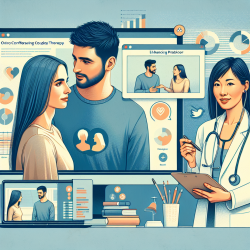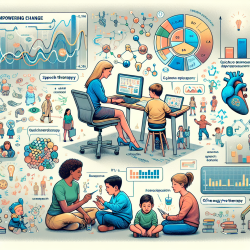In the rapidly evolving landscape of psychological therapy, videoconferencing has emerged as a viable and effective medium for delivering couples therapy. A recent qualitative study titled "Expectations and Experiences of Couples Receiving Therapy Through Videoconferencing: A Qualitative Study" provides valuable insights that can help practitioners enhance their skills and optimize therapy outcomes for their clients.
This study, conducted by Kysely et al. (2020), explored the expectations and experiences of 15 couples who participated in the Couple CARE program via videoconferencing. The research identified several themes that can inform best practices for practitioners delivering therapy through this medium.
Key Findings and Practical Implications
- New Experience: Many couples found videoconferencing to be a novel experience. Practitioners should be prepared to address initial skepticism and provide a clear explanation of the process to set realistic expectations.
- Comparison to Face-to-Face Therapy: Couples had mixed feelings about the effectiveness of videoconferencing compared to traditional face-to-face therapy. Some appreciated the reduced emotional intensity, while others missed the physical presence of the therapist. Practitioners should emphasize the unique benefits of videoconferencing, such as increased comfort and reduced stigma.
- Practical Aspects: Technical issues, such as audio and video quality, were a common concern. Ensuring high-quality, reliable technology is crucial for a positive therapeutic experience. Additionally, offering therapy sessions from clients' homes can enhance comfort and openness.
- Connection and Dynamics: Despite initial doubts, many couples reported feeling connected to their therapist and appreciated the "distance" created by the screen, which allowed them to feel more in control. Practitioners should focus on building a strong therapeutic alliance by actively engaging with clients and demonstrating empathy through verbal and non-verbal cues.
- Confidentiality and Safety: Concerns about confidentiality and safety were noted. Practitioners must ensure that sessions are conducted in a secure, private environment and communicate safety procedures clearly to clients.
Encouraging Further Research
While this study provides valuable insights, there is a need for further research to explore the experiences of different populations and the long-term efficacy of videoconferencing therapy. Future studies could investigate the impact of personality traits on clients' willingness to engage in online therapy and explore the benefits of combined delivery methods, such as alternating between face-to-face and videoconferencing sessions.
In conclusion, the findings from this study highlight the potential of videoconferencing as a powerful tool for delivering couples therapy. By understanding and addressing clients' expectations and experiences, practitioners can enhance their skills and create more effective therapeutic interventions.
To read the original research paper, please follow this link: Expectations and Experiences of Couples Receiving Therapy Through Videoconferencing: A Qualitative Study.










